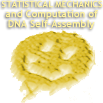Speaker
Prof.
Erik Winfree
(Caltech)
Description
Self-assembly is a fundamental process in the
self-organization of biological as well as non-biological
structures. Passive self-assembly of molecular units, being
driven just by thermodynamic binding energies and the
geometrical structure of the molecules, would seem to be the
simplest case to study -- but it can be remarkably
complicated. In fact, in a model of generalized crystal
growth abstracted as the self-assembly of Wang tiles,
passive self-assembly can be shown to be Turing universal.
This leads to a number of theoretical observations: complex
shapes that have concise algorithmic descriptions can be
self-assembled from a small number of parts; these
self-assembled structures can perform error correction
during growth and can self-heal after damage; and as a
simple form of self-replication, algorithmic crystals could
provide an abiological example of Darwinian evolution. In
our lab, we have been working to demonstrate these
principles experimentally, using molecular Wang tiles
constructed from DNA.
Primary author
Prof.
Erik Winfree
(Caltech)

